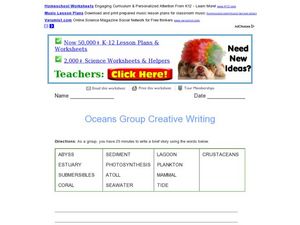Curated OER
Determining the Amount of Transpiration from a Schoolyard Tree
Students calculate the amount of water transpired by a single leaf and estimate that transpired by an entire rainforest.
Curated OER
Ecosystems and Climate
Pupils examine climatic effects on ecosystems. They plant tomatoes and observe the differences in plant growth with differences in light. They create picture collages of plants, animals, and insects found in each climate of the U.S.
Curated OER
Making Hypotheses
Fourth graders practice making hypotheses about what they believe occur as they perform an osmosis experiment in class. This experiment is designed to illustrate how important it is to make an accurate hypothesis.
Curated OER
Who Has the Light?
Students study ways in which the ability to produce light may be useful to deep-sea organisms. In groups, they research and present to the rest of the class, how a specific organism is able to produce bioluminescence.
Curated OER
Mapping Deep-Sea Habitat
Students create a two-dimensional topographic map and a 3-D model of landforms. In this creative lesson students create 2 and 3-D objects and learn how to interpret the data from these things.
Curated OER
Engineering
Students examine how Shell uses engineering. In this engineering principles lesson students visit a web-pages, answer questions, and examine the ways that engineers go about exploring different ideas.
Curated OER
Ocean Vocabulary
In this vocabulary worksheet, students match words related to the ocean to their definitions. Worksheet is labeled as a quiz, but may be used as review/practice.
Curated OER
Archaeology Underwater
Eleventh graders study underwater archaeology. In this history lesson, 11th graders read an article on archaeology. Students complete a reading comprehension worksheet on archaeology underwater.
Curated OER
the New Explorers:Into the Depths
Students explore the self preservation mechanism that is inherent in the Great Lakes. They examine how scientists are studying Great Lakes, and what their predictions are for these national treasures.
Curated OER
Is There Sewage in My Sample?
Students explore the proximity of the Hudson Shelf Valley and the Hudson Canyon to one of the Nation's most populated areas. They study that from 1987 to 1992, two dumpsites in the Hudson Shelf Valley and Hudson Canyon, one 12 miles
Curated OER
Mapping Seamounts in the Gulf of Alaska
Students describe major topographic features on the Patton Seamount, and interpret two-dimensional topographic data. They create three-dimensional models of landforms from two-dimensional topographic data.
Curated OER
Twisted Vision
Students explain polarization vision and why some animals have it while others do not. They examine the reasons why it would be helpful for marine organisms to have polarized light.
Curated OER
Cool Lights
Learners investigate how and why deep-sea organisms produce light. They examine how these processes can be used to study deep ocean environments.
Curated OER
Where is That Light Coming From?
Students investigate the chemistry of bioluminescence and discuss how various organisms benefit from this trait. They prepare a report about of at least one organism that receives each of the benefits discussed.
Curated OER
Sea Secrets
Students study the following: For centuries, people have been challenged by the mysteries that lie beneath the blue depths of our ocean planet. Very little was known about the ocean until late in the nineteenth century, although nearly...
Curated OER
Aquatic Exercise - Object Retrieval
Middle schoolers are introduced to a variety of exercises to do in the water. In groups, they swim in the deep part of the pool to retrieve objects at the bottom. To end the lesson, they practice techniques to help them breathe and...
Curated OER
Secret Message
Students use the characteristic of a chemical reaction to write a secret letter. In this chemical reaction lesson plan, students will use common house hold products including iodine, lemon, and notebook paper to produce a chemical...
Curated OER
Oceans Group Creative Writing
In this writing about oceans worksheet, students use words given in a word bank and write a brief story about oceans, working with a group.
NOAA
Noaa: Submersibles
Learn more about the technology that's involved in oceanography. This resource contains descriptions and pictures of thirteen different submersibles and remotely operated vehicles.
American Museum of Natural History
American Museum of Natural History: O Logy: Journey to Deep Sea Vents
Take a submersible down to the seafloor. As you descend, passing through the ocean's sunlight, twilight, and midnight zones, you can observe how temperature, pressure, and light levels change. When your submersible reaches the seafloor,...
Woods Hole Oceanographic Institution
Woods Hole Oceanographic Institution: Trenches
Explains what ocean trenches are and why they are important. Includes links to videos, additional articles, and information about some deep-ocean submersibles.
PBS
Pbs Teachers: Scientific American: Beneath the Sea: Blowing Ballast
Explore the use of ballast to manipulate buoyancy in submarines by building a model of a submersible using two-liter bottles and balloons. Describe the balance of forces that is responsible for the surfacing and diving of submersibles.
Curated OER
Web Gallery of Art: Submersion of Pharaoh in the Red Sea
An image of "Submersion of Pharaoh in the Red Sea", created by Andrea Previtali from 1515-20 (Oil on canvas, 132 x 213 cm).
University of Florida
Uf Ifas: Silent Invaders
Learn about plants specific to Florida including the effects of invasive species.






















